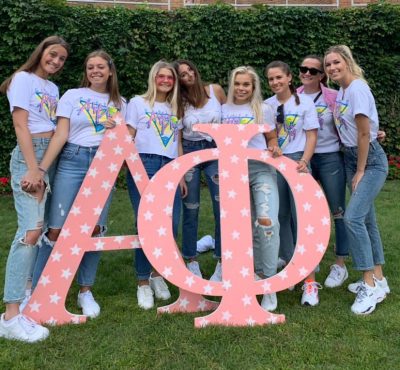
Sororities and fraternities — social, professional or otherwise — have a large social component embedded in their systems. Due to the pandemic’s social distancing restrictions, however, these groups must adapt recruitment to virtual formats.
Boston University has a total of 18 fraternities and 12 sororities, with fraternities formally rushing during the Fall semester and sororities in the Spring.
BU’s Kappa Sigma Fraternity President Calvin Heffes said running the fraternity has become more difficult with all the public health restrictions.
“It’s very tough to run an organization, convince people to stick around, convince people to pay dues,” Heffes said, “and keep everything going when we can’t even be in the same room together.”
Rush has been as personal as possible, given social distance guidelines, for those hoping to get to know the fraternity, Heffes said. He said the frat hosted an off-campus rush event allowing students to come in groups of 10.
Heffes said this semester’s pledge class is about half the size as the previous Fall’s, at around 10 people. The decrease in numbers this year, he said, is largely because prospective brothers do not know how the pandemic will progress and how long restrictions will last.
“Lots of kids are waiting,” Heffes said. “They don’t want to join right now because they don’t know what’s going to happen.”
Part of the reason Kappa Sigma is taking fewer pledges this year, Heffes said, is to enable all pledges to be in a room together without breaking University rules.
“If we took a pledge class of 30, we wouldn’t be able to,” Heffes said. “It’s really important for our process that the pledges can all … get to know each other really well.”
Kappa Sigma is still working to determine how its annual Open House fundraiser will operate this Fall. Last Fall, the fraternity raised about $20,000, Heffes said, for Habitat for Humanity through a concert at Royale.
Before the pandemic, the plan was to host this year’s concert either in the Boston Common or on Nickerson Field. Though the event was canceled, Heffes said the fraternity has raised money virtually for the Greater Boston Food Bank during the pandemic.
“The virtual stuff’s tough,” Heffes said. “It’s hard to actually get people excited to donate their time and money to stuff when there’s no physical event happening.”
Alpha Chi Sigma, a professional chemistry fraternity, has also experienced lower numbers of potential brothers at rush events.
Public Relations Chair Andy Vo said the decreased turnout at virtual events was expected, but that the fraternity is engaging with those interested as best as possible via virtual library hours — essentially daily Zoom study sessions.
“It’s a way to get to know our pledges,” Vo said. “On the outside, it may seem pretty rigorous to have to attend four library hours a week but time really does fly. You’re cramming for exams and sharing laughs over stories and memories.”
Vo also said adapting to public health restrictions has been a stressful undertaking for the fraternity.
“COVID-19 really has tested the limits of our creativity,” Vo said. “Everything’s up in the air right now.”
Alpha Phi, a social sorority at BU, is rushing in the Spring. Marina Berardino, vice president of Member Recruitment, said she has been encouraging students to attend recruitment events, especially freshmen who may be seeking ways to make friends.
But all in-person Fall events are on hold and must for now be tweaked to fit an online format, Berardino said.
The Red Dress Gala, an annual event for Alpha Phi that supports the American Heart Association, typically occurs during Parents’ Weekend when families are able to come together. However, it will have to be virtual this year.
“Our head of philanthropy is working hard to plan that, so that’s really exciting for us,” Berardino said. “It’s been frustrating to try to still host our events with [COVID-19] but we’re finding ways to adapt to it and still raise lots of money.”
Omega Phi Alpha, a community service sorority, is also conducting its formal rush in the spring.
Amanda McFarland, sorority president, said a main problem is maintaining unity among sisters while abiding by public health restrictions.
“It’s difficult because we want to still have that sisterhood element, but we can’t do the typical service we would,” McFarland said. “We’re getting a lot of information in waves from [Student Activities Office], which does make it difficult sometimes to make decisions.”
McFarland said Omega Phi Alpha usually does community service for a variety of organizations during the school year, but that the pandemic has turned a lot of that service remote.
“We need to be really mindful of the fact that we work with a lot of populations that are low-income, undocumented or people who are experiencing homelessness,” McFarland said. “We can’t go into those communities right now because it would be extremely dangerous and irresponsible.”
Lauren Fox, a freshman in the College of Communication, said she was planning on rushing before the pandemic but is wary about a virtual rush potentially making it hard to make connections.
“You want to be able to meet people, even more than before, and rush would definitely help with that,” Fox said. “But also since that might be virtual, that might be harder to do.”
Katherine Berberian, a freshman in the College of Arts and Sciences, said although Greek Life would be a way to meet new friends, she believes the virtual state of things could inhibit what typically makes the process appealing.
“I don’t know how many things you’ll get to be in and do,” Berberian said. “And especially with [COVID-19], it seems like there’s a lot of uncertainty surrounding that.”
Chloe Liu contributed to the reporting of this article.






























































































































alana • Sep 23, 2020 at 12:59 pm
CHAR CHARRRRRR